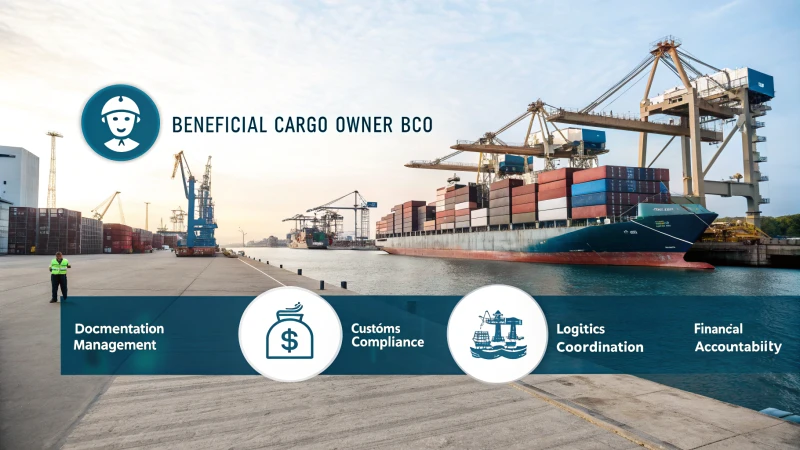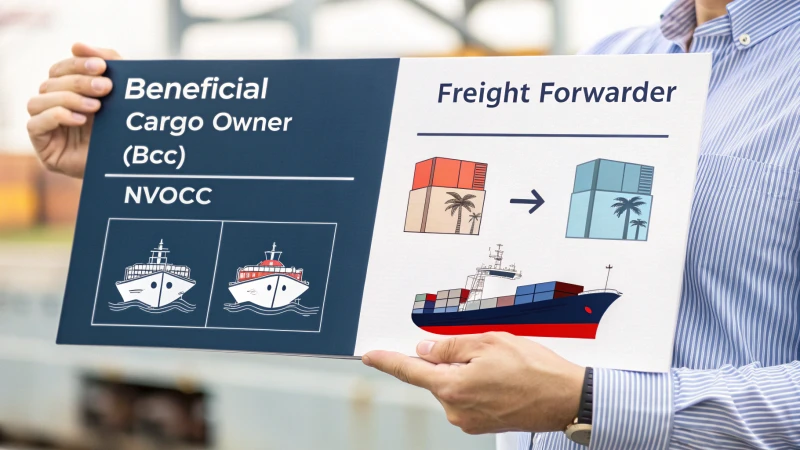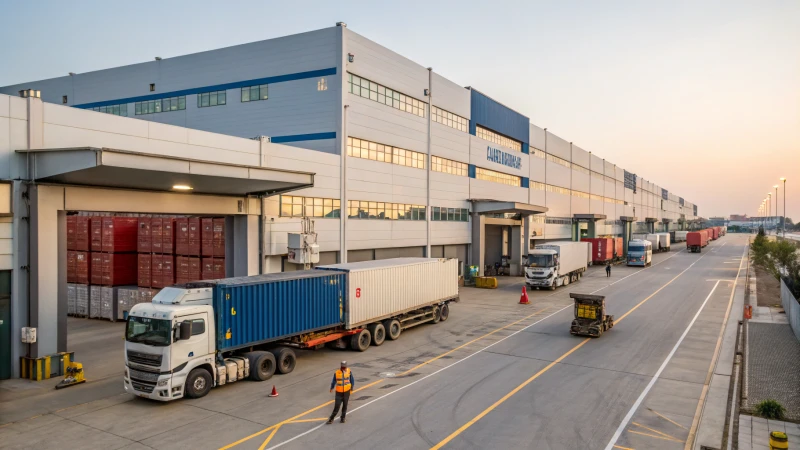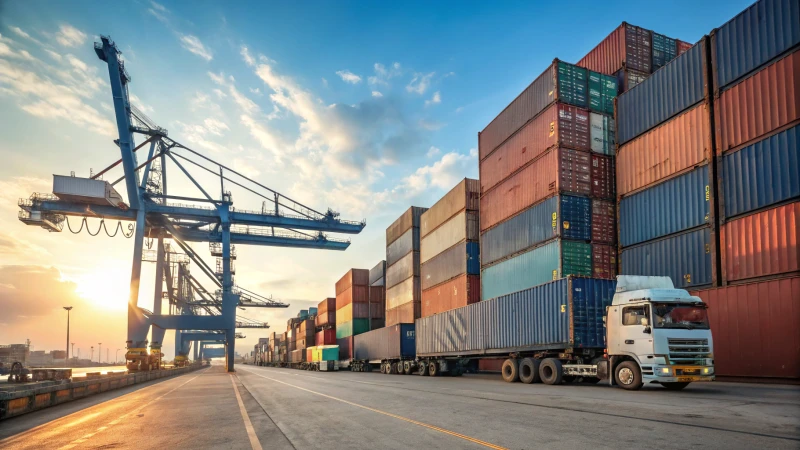Ever stumbled across a term like BCO and felt lost in the logistics lingo?
BCO stands for Beneficial Cargo Owner, the person or business that owns the goods being shipped and is financially responsible for them during transit. They play a key role in logistics by either managing transportation directly or collaborating with carriers.
When I first started importing goods for my business, understanding the ins and outs of being a BCO was daunting. But it turns out, knowing what it means can really streamline your operations. As a BCO, you're not just signing off on shipments—you're actively involved in ensuring that your products get where they need to be, on time and intact. Whether you handle logistics yourself or partner with reliable carriers, it's all about maintaining control and accountability. In this article, let's dive deeper into the world of BCOs and see how this role fits into the bigger picture of shipping and supply chain management.
BCO stands for Beneficial Cargo Owner.True
BCO is an acronym for Beneficial Cargo Owner in logistics.
A BCO is not responsible for goods during transit.False
BCOs are financially responsible for goods during transit.
What Are the Key Responsibilities of a Beneficial Cargo Owner?
Being a Beneficial Cargo Owner (BCO) feels like juggling many hats, each with its own set of challenges and rewards.
As a Beneficial Cargo Owner, my main responsibilities include managing import/export documentation, ensuring customs compliance, coordinating logistics, and maintaining financial accountability for the cargo during its journey.

Managing Import and Export Documentation
One of my primary responsibilities as a Beneficial Cargo Owner1 is managing all the paperwork involved in importing and exporting goods. I remember the first time I had to prepare a bill of lading and a commercial invoice—it felt overwhelming! But over time, I've learned that meticulous documentation is crucial for smooth shipping processes. Ensuring every detail is correct helps avoid those dreaded delays at customs.
Ensuring Customs Compliance
Navigating customs regulations is like trying to learn a new language, but it's an essential part of my job. As a BCO, I must understand the legal requirements of both the originating and destination countries. This means staying updated on tariff classifications and value declarations, which can be tricky. I sometimes partner with customs brokers to ensure everything's in line, but ultimately, the buck stops with me.
Overseeing Logistics Coordination
Logistics coordination might sound daunting, but it's essentially about finding the right carriers and negotiating shipping rates. I once had to juggle between cost efficiency and timely delivery for a batch of exclusive handbags, learning the hard way how crucial this balancing act is. Effective logistics management ensures my products reach customers without unnecessary hiccups.
Financial Accountability During Transit
Handling the financial side of things involves keeping track of freight charges, customs duties, and other fees. It's not just about paying bills; it's about securing insurance coverage to protect against any mishaps along the way. I learned this lesson when a shipment was damaged in transit—thank goodness for cargo insurance!
| Responsibility | Description |
|---|---|
| Documentation Management | Preparing necessary shipping documents |
| Customs Compliance | Ensuring adherence to import/export regulations |
| Logistics Coordination | Selecting carriers and managing shipping schedules |
| Financial Accountability | Handling payment of freight charges and securing cargo insurance |
Engaging with Third-Party Services
While I try to manage most tasks directly, sometimes I need to bring in the experts. Collaborating with freight forwarders2 or logistics consultants can streamline operations, but it's crucial to oversee these partnerships closely. Ultimately, maintaining control helps me ensure everything goes according to plan.
Understanding these responsibilities has been key in helping me streamline operations and minimize risks in international shipping. Every step I've taken as a BCO has taught me something new, and each lesson makes me better equipped for the next challenge.
BCOs must prepare all import/export documents.True
BCOs handle documentation like bills of lading and invoices for legal transport.
BCOs are not responsible for customs compliance.False
BCOs must ensure adherence to customs regulations to avoid legal issues.
What Makes a BCO Different from a Freight Forwarder or NVOCC?
Navigating the logistics world can feel like steering a ship through uncharted waters, but knowing the roles of BCOs, freight forwarders, and NVOCCs makes the journey smoother.
A Beneficial Cargo Owner (BCO) manages their goods directly, while freight forwarders and NVOCCs act as go-betweens, offering varying degrees of control over logistics.

Understanding the Beneficial Cargo Owner (BCO)
I remember when I first dipped my toes into the world of shipping; the term Beneficial Cargo Owner (BCO) seemed like a foreign language. A BCO actually owns the goods and manages the shipping process themselves. Imagine being at the helm of your own ship, steering it towards cost-effective logistics3 and streamlined operations. This direct control over contracts with carriers often means I can keep a closer eye on both costs and timelines—crucial for keeping my business running smoothly.
What Does a Freight Forwarder Do?
On the other hand, working with a freight forwarder felt like having a trusty sidekick. Freight forwarders step in to handle the nitty-gritty details of moving goods. They take on everything from customs documentation to supply chain management4. It’s like having a logistics expert in your corner, especially if you're not ready to dive deep into shipping knowledge yourself.
| Service | BCO | Freight Forwarder |
|---|---|---|
| Control | High | Medium |
| Logistics Handling | Direct | Intermediary |
| Cost Management | Direct | Service Fees |
Exploring Non-Vessel Operating Common Carriers (NVOCC)
Then there’s the Non-Vessel Operating Common Carrier (NVOCC), which adds another layer to the mix. NVOCCs operate under different legal frameworks but share some traits with freight forwarders. They reserve space with carriers and then resell it to shippers. This setup offers flexibility and often competitive shipping rates5, which can be a lifesaver for smaller businesses looking to consolidate services without hefty costs.
Comparing Roles and Responsibilities
- BCO: Directly manages logistics, granting greater control and potential cost savings.
- Freight Forwarder: Acts as a logistics coordinator, taking care of documentation, customs clearance, and transport arrangements.
- NVOCC: Offers consolidated services similar to freight forwarders but targets smaller shippers.
Deciding between these options depends largely on your business’s specific needs, expertise, and shipment volumes. For anyone trying to find the best fit for their shipping strategy, understanding these differences is key to unlocking better shipping solutions6.
BCOs have more control over shipping costs than NVOCCs.True
BCOs manage logistics directly, allowing them to control costs better.
Freight forwarders own the goods they ship.False
Freight forwarders are intermediaries and do not own the goods.
Why Is Understanding BCO Important for E-commerce Businesses?
Have you ever wondered how mastering logistics can transform your e-commerce game?
Understanding Beneficial Cargo Owners (BCOs) is essential for e-commerce businesses to optimize logistics. By managing shipping directly and avoiding intermediaries, BCOs reduce costs and enhance supply chain efficiency, critical for timely inventory restocking.

The Role of BCO in E-commerce Logistics
When I first started my e-commerce journey, managing logistics felt like trying to solve a giant puzzle with missing pieces. But then I learned about Beneficial Cargo Owners (BCOs), and suddenly, everything clicked. As the ultimate owners of the goods, BCOs have a hands-on role from shipment to delivery, which means they can streamline their logistics processes significantly.
Take Linda, who runs a niche fashion accessory store like mine. By understanding the ins and outs of BCO roles, she can eliminate unnecessary middlemen and take direct control over her shipping processes. This involves collaborating closely with carriers to arrange transportation without relying on third-party intermediaries like freight forwarders or NVOCCs7. This level of autonomy not only lets her negotiate better rates but also enables her to optimize shipping routes.
Benefits of Direct Shipping Management
- Cost Efficiency: I found that bypassing intermediaries as a BCO helped me cut down on overhead costs. These savings can either be passed on to consumers or reinvested into the business to fuel growth.
- Improved Speed: Having direct control over shipping allows me to select faster delivery options, ensuring my inventory is restocked promptly—an absolute must for staying competitive in e-commerce.
- Enhanced Reliability: Fewer intermediaries mean less chance for delays. This reliability builds customer trust, something I value deeply in my own business.
| Advantages | Impact on E-commerce |
|---|---|
| Reduced Costs | Lower product prices or higher profit margins |
| Faster Shipping | Quick inventory turnover and enhanced customer service |
| Increased Reliability | Greater customer trust and loyalty |
Leveraging BCO Insights for Competitive Advantage
Understanding and leveraging the role of a BCO has been a game-changer for me. It allows for a more agile approach to inventory management and distribution strategies—key ingredients for success in today’s fast-paced market environment.
Consider Linda again. By embracing her role as a BCO, she can directly influence supply chain decisions, reducing lead times and improving the accuracy of documentation and customs handling.
To truly harness these benefits, businesses should consider partnerships with experienced logistics firms like Gofreighter8. They offer the expertise needed to navigate international trade complexities and provide tailored solutions that align perfectly with specific business needs. I’ve found that working with them has made my logistics journey not just smoother but also more rewarding.
BCOs eliminate the need for freight forwarders.True
BCOs manage shipping directly, bypassing intermediaries like freight forwarders.
Direct shipping increases delivery delays for BCOs.False
Direct control reduces delays by minimizing intermediary involvement in shipping.
What Challenges Do Beneficial Cargo Owners Face in Global Trade?
Embarking on the global trade journey as a Beneficial Cargo Owner (BCO) is like navigating an intricate labyrinth.
As a Beneficial Cargo Owner, I face challenges in global trade, including navigating complex regulations, managing logistics, handling geopolitical uncertainties, and balancing costs. Overcoming these requires strategic planning and robust supply chain management.

Understanding Compliance Challenges
When it comes to compliance, it's like trying to solve a puzzle where the pieces keep changing shape. Every region has its own set of rules, and I've found myself knee-deep in paperwork more times than I can count. For example, shipping my fashion accessories from China to the UK means dealing with a unique set of documents compared to shipping within Europe. It's essential to stay on top of these requirements to avoid any hiccups.
| Region | Documentation Required |
|---|---|
| Europe | EU Declaration Form |
| Asia | Country-Specific Documents |
| North America | NAFTA Certificate |
Understanding these requirements is crucial for smooth operations.
Managing Geopolitical Uncertainties
Geopolitical factors are like the weather—unpredictable and often inconvenient. I remember the anxiety during the U.S.-China trade tensions, wondering how tariffs would impact my shipping costs. It's crucial to stay informed and ready to adapt at a moment's notice. The supply chain9 dynamics can be significantly affected by such geopolitical events.
Logistics and Transportation Complexities
Logistics can feel like playing a high-stakes game of chess. Should I choose air freight for speed or sea freight for cost savings? Each option has its own set of pros and cons, and sometimes, the decision comes down to what's most important at that moment—speed or cost.
- Air Freight: Faster but more expensive.
- Sea Freight: Slower but cost-effective10.
Balancing Cost-Efficiency and Speed
Striking the right balance between cost-efficiency and speed is like walking a tightrope. There have been times when I've had to weigh the benefits of faster delivery against the impact on my budget. This delicate balance influences everything from carrier choices to supply chain efficiency11.
To succeed as a BCO, I've learned that staying flexible and informed is key. By navigating these challenges thoughtfully, I can maintain a competitive edge in the ever-evolving world of global trade.
BCOs must comply with the same documentation globally.False
Documentation requirements vary by region, such as EU or NAFTA forms.
Geopolitical factors can affect BCO shipping costs.True
Trade wars and sanctions impact shipping routes and costs for BCOs.
Conclusion
BCO, or Beneficial Cargo Owner, refers to the entity responsible for goods during shipping, managing logistics and documentation to ensure timely and compliant delivery.
-
Explore this link for a comprehensive breakdown of BCO responsibilities in global trade. ↩
-
Learn how freight forwarders can support BCOs in logistics management. ↩
-
Understanding BCO benefits helps businesses evaluate if direct logistics management suits their operations. ↩
-
Learn how freight forwarders streamline processes and manage complexities in global supply chains. ↩
-
Discover how NVOCCs negotiate rates and provide cost-effective shipping solutions. ↩
-
Explore shipping options tailored to e-commerce needs for efficiency and cost savings. ↩
-
Discover the role of NVOCCs and how they differ from BCOs to understand your logistics options better. ↩
-
Explore Gofreighter's tailored logistics solutions to enhance your e-commerce supply chain efficiency. ↩
-
Exploring the effects of geopolitical tensions helps BCOs adapt their strategies effectively. ↩
-
Discovering cost-effective options aids in optimizing shipping expenses while maintaining efficiency. ↩
-
Balancing these factors enhances decision-making for better supply chain outcomes. ↩




